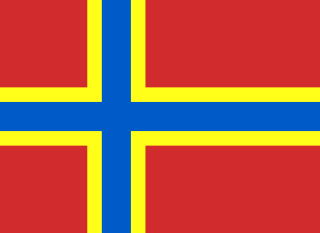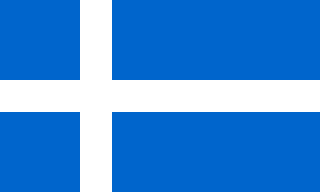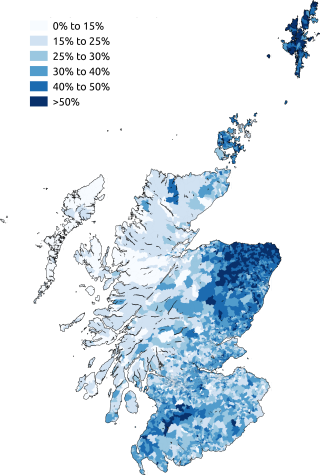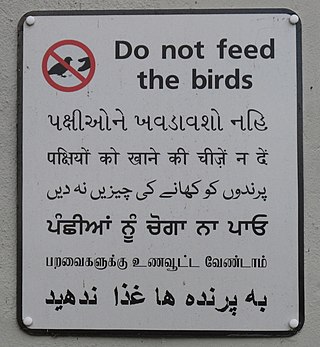Norn is an extinct North Germanic language that was spoken in the Northern Isles off the north coast of mainland Scotland and in Caithness in the far north of the Scottish mainland. After Orkney and Shetland were pledged to Scotland by Norway in 1468–69, it was gradually replaced by Scots. Norn is thought to have become extinct around 1850, after the death of Walter Sutherland, the language's last known speaker, though there are claims the language persisted as late as the 20th century.

Orkney, also known as the Orkney Islands, is an archipelago in the Northern Isles of Scotland, situated off the north coast of the island of Great Britain. Orkney is 10 miles (16 km) north of the coast of Caithness and has about 70 islands, of which 20 are inhabited. The largest island, the Mainland, has an area of 523 square kilometres (202 sq mi), making it the sixth-largest Scottish island and the tenth-largest island in the British Isles. Orkney's largest settlement, and also its administrative centre, is Kirkwall.

Shetland, also called the Shetland Islands, is an archipelago in Scotland lying between Orkney, the Faroe Islands, and Norway. It is the northernmost region of the United Kingdom.

Doric, the popular name for Mid Northern Scots or Northeast Scots, refers to the Scots language as spoken in the northeast of Scotland. There is an extensive body of literature, mostly poetry, ballads, and songs, written in Doric. In some literary works, Doric is used as the language of conversation while the rest of the work is in Lallans Scots or British English. A number of 20th and 21st century poets have written poetry in the Doric dialect.

Scots is an Anglic language variety in the West Germanic language family, spoken in Scotland and parts of Ulster in the north of Ireland. Most commonly spoken in the Scottish Lowlands, Northern Isles, and northern Ulster, it is sometimes called Lowland Scots to distinguish it from Scottish Gaelic, the Goidelic Celtic language that was historically restricted to most of the Scottish Highlands, the Hebrides, and Galloway after the sixteenth century; or Broad Scots to distinguish it from Scottish Standard English. Modern Scots is a sister language of Modern English, as the two diverged independently from the same source: Early Middle English (1100–1300).
A trow is a malignant or mischievous fairy or spirit in the folkloric traditions of the Orkney and Shetland islands. Trows may be regarded as monstrous giants at times, or quite the opposite, short-statured fairies dressed in grey.

English, in various dialects, is the most widely spoken language of the United Kingdom, but a number of regional and migrant languages are also spoken. Regional indigenous languages are Scots and Ulster Scots and the Celtic languages, Irish, Scottish Gaelic, Welsh and, as a revived language with few speakers, Cornish. British Sign Language is also used. There are also many languages spoken by immigrants who arrived recently to the United Kingdom, mainly within inner city areas; these languages are mainly from continental Europe and South Asia.

Foula, located in the Shetland archipelago of Scotland, is one of the United Kingdom's most remote permanently inhabited islands. Owned since the turn of the 20th century by the Holbourn family, the island was the location for the film The Edge of the World (1937). The liner RMS Oceanic was wrecked on the nearby Shaalds of Foula in 1914. The island has a post office.

The Northern Isles are a chain of islands off the north coast of mainland Scotland. The climate is cool and temperate and highly influenced by the surrounding seas. There are two main island groups: Shetland and Orkney. There are a total of 36 inhabited islands, with the fertile agricultural islands of Orkney contrasting with the more rugged Shetland islands to the north, where the economy is more dependent on fishing and the oil wealth of the surrounding seas. Both archipelagos have a developing renewable energy industry. They share a common Pictish and Norse history, and were part of the Kingdom of Norway before being absorbed into the Kingdom of Scotland in the 15th century. The islands played a significant naval role during the world wars of the 20th century.
Uyea is an uninhabited island, lying south of Unst in Shetland, Scotland.
Old Norwegian, also called Norwegian Norse, is an early form of the Norwegian language that was spoken between the 11th and 14th century; it is a transitional stage between Old West Norse and Middle Norwegian.

Shetland dialect is a dialect of Insular Scots spoken in Shetland, an archipelago to the north of mainland Scotland. It is derived from the Scots dialects brought to Shetland from the end of the fifteenth century by Lowland Scots, mainly from Fife and Lothian, with a degree of Norse influence from the Norn language, which is an extinct North Germanic language spoken on the islands until the late 18th century.
Orcadian dialect or Orcadian Scots is a dialect of Insular Scots, itself a dialect of the Scots language. It is derived from Lowland Scots, with a degree of Norwegian influence from the Norn language.

Orcadians, also known as Orkneymen, are an ethnic group native to the Orkney Islands, who speak an Orcadian dialect of the Scots language, a West Germanic language, and share a common history, culture and ancestry. Speaking Norn, a native North Germanic language into the 19th or 20th century, Orcadians descend significantly from North Germanic peoples, with around a third of their ancestry derived from Scandinavia, including a majority of their patrilineal line. According to anthropological study, the Orcadian ethnic composition is similar to that of Icelandic people; a comparable islander ethnicity of North Germanic origin.

The languages of Scotland belong predominantly to the Germanic and Celtic language families. The main language now spoken in Scotland is English, while Scots and Scottish Gaelic are minority languages. The dialect of English spoken in Scotland is referred to as Scottish English.
Shetland literature is literature written in Shetland, Scotland, or by writers from Shetland. The literature is often written in Shetland dialect or its parent language, Norn, and often depicts the history and folklore of Shetland. Common themes include reflections on island life and proximity to the sea, it is fishing and crofting traditions, the weather and seasons as determined by Shetland's climate, Shetland's unique landscape, its flora and fauna, and the influence of the people's Viking heritage. Folklore often displays features seen similarly in Scandinavia and some Celtic traditions.
A nuggle, njuggle, or neugle, is a mythical water horse of primarily Shetland folklore where it is also referred to as a shoepultie or shoopiltee on some parts of the islands. A nocturnal creature that is always of a male gender, there are occasional fleeting mentions of him connected with the Orkney islands but he is more frequently associated with the rivers, streams and lochs of Shetland. He is easily recognised by his distinctive wheel-like tail and, unlike his evil counterparts the each-uisge or the nuckelavee, has a fairly gentle disposition being more prone to playing pranks and making mischief rather than having malicious intents.

The modern names of Scottish islands stem from two main influences. There are many names that derive from the Scottish Gaelic language in the Hebrides and Firth of Clyde. In the Northern Isles most place names have a Norse origin. There are also some island place names that originate from three other influences, including a limited number that are essentially English language names, a few that are of Brittonic origin and some of an unknown origin that may represent a pre-Celtic language. These islands have all been occupied by the speakers of at least three and in many cases four or more languages since the Iron Age, and many of the names of these islands have more than one possible meaning as a result.









